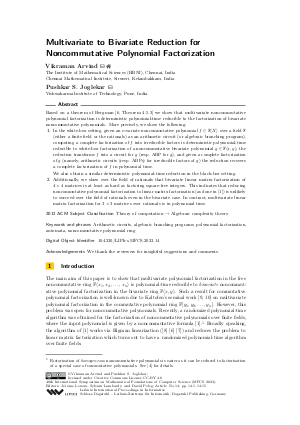Multivariate to Bivariate Reduction for Noncommutative Polynomial Factorization
Authors Vikraman Arvind, Pushkar S. Joglekar
-
Part of:
Volume:
48th International Symposium on Mathematical Foundations of Computer Science (MFCS 2023)
Part of: Series: Leibniz International Proceedings in Informatics (LIPIcs)
Part of: Conference: Mathematical Foundations of Computer Science (MFCS) - License:
 Creative Commons Attribution 4.0 International license
Creative Commons Attribution 4.0 International license
- Publication Date: 2023-08-21
File

PDF
LIPIcs.MFCS.2023.14.pdf
- Filesize: 0.63 MB
- 15 pages
Document Identifiers
Subject Classification
ACM Subject Classification
- Theory of computation → Algebraic complexity theory
Keywords
- Arithmetic circuits
- algebraic branching programs
- polynomial factorization
- automata
- noncommutative polynomial ring
Metrics
- Access Statistics
-
Total Accesses (updated on a weekly basis)
0PDF Downloads0Metadata Views
Abstract
Based on a theorem of Bergman [Cohn, 2006] we show that multivariate noncommutative polynomial factorization is deterministic polynomial-time reducible to the factorization of bivariate noncommutative polynomials. More precisely, we show the following: 1) In the white-box setting, given an n-variate noncommutative polynomial f ∈ 𝔽⟨X⟩ over a field 𝔽 (either a finite field or the rationals) as an arithmetic circuit (or algebraic branching program), computing a complete factorization of f into irreducible factors is deterministic polynomial-time reducible to white-box factorization of a noncommutative bivariate polynomial g ∈ 𝔽⟨x,y⟩; the reduction transforms f into a circuit for g (resp. ABP for g), and given a complete factorization of g (namely, arithmetic circuits (resp. ABPs) for irreducible factors of g) the reduction recovers a complete factorization of f in polynomial time. We also obtain a similar deterministic polynomial-time reduction in the black-box setting. 2) Additionally, we show over the field of rationals that bivariate linear matrix factorization of 4× 4 matrices is at least as hard as factoring square-free integers. This indicates that reducing noncommutative polynomial factorization to linear matrix factorization (as done in [Vikraman Arvind and Pushkar S. Joglekar, 2022]) is unlikely to succeed over the field of rationals even in the bivariate case. In contrast, multivariate linear matrix factorization for 3×3 matrices over rationals is in polynomial time.
Cite As Get BibTex
Vikraman Arvind and Pushkar S. Joglekar. Multivariate to Bivariate Reduction for Noncommutative Polynomial Factorization. In 48th International Symposium on Mathematical Foundations of Computer Science (MFCS 2023). Leibniz International Proceedings in Informatics (LIPIcs), Volume 272, pp. 14:1-14:15, Schloss Dagstuhl – Leibniz-Zentrum für Informatik (2023)
https://doi.org/10.4230/LIPIcs.MFCS.2023.14
BibTex
@InProceedings{arvind_et_al:LIPIcs.MFCS.2023.14,
author = {Arvind, Vikraman and Joglekar, Pushkar S.},
title = {{Multivariate to Bivariate Reduction for Noncommutative Polynomial Factorization}},
booktitle = {48th International Symposium on Mathematical Foundations of Computer Science (MFCS 2023)},
pages = {14:1--14:15},
series = {Leibniz International Proceedings in Informatics (LIPIcs)},
ISBN = {978-3-95977-292-1},
ISSN = {1868-8969},
year = {2023},
volume = {272},
editor = {Leroux, J\'{e}r\^{o}me and Lombardy, Sylvain and Peleg, David},
publisher = {Schloss Dagstuhl -- Leibniz-Zentrum f{\"u}r Informatik},
address = {Dagstuhl, Germany},
URL = {https://drops.dagstuhl.de/entities/document/10.4230/LIPIcs.MFCS.2023.14},
URN = {urn:nbn:de:0030-drops-185480},
doi = {10.4230/LIPIcs.MFCS.2023.14},
annote = {Keywords: Arithmetic circuits, algebraic branching programs, polynomial factorization, automata, noncommutative polynomial ring}
}
Author Details
- The Institute of Mathematical Sciences (HBNI), Chennai, India
- Chennai Mathematical Institute, Siruseri, Kelambakkam, India
Acknowledgements
We thank the reviewers for insightful suggestions and comments.
References
- Vikraman Arvind and Pushkar S. Joglekar. On efficient noncommutative polynomial factorization via higman linearization. In Shachar Lovett, editor, 37th Computational Complexity Conference, CCC 2022, July 20-23, 2022, Philadelphia, PA, USA, volume 234 of LIPIcs, pages 12:1-12:22. Schloss Dagstuhl - Leibniz-Zentrum für Informatik, 2022. URL: https://doi.org/10.4230/LIPIcs.CCC.2022.12.
- Vikraman Arvind, Pushkar S. Joglekar, Partha Mukhopadhyay, and S. Raja. Randomized polynomial time identity testing for noncommutative circuits. In Proceedings of the 49th Annual ACM SIGACT Symposium on Theory of Computing, STOC 2017, Montreal, QC, Canada, June 19-23, 2017, pages 831-841, 2017. URL: https://doi.org/10.1145/3055399.3055442.
- Vikraman Arvind, Partha Mukhopadhyay, and Srikanth Srinivasan. New results on noncommutative and commutative polynomial identity testing. Comput. Complex., 19(4):521-558, 2010. URL: https://doi.org/10.1007/s00037-010-0299-8.
- Vikraman Arvind, Gaurav Rattan, and Pushkar S. Joglekar. On the complexity of noncommutative polynomial factorization. In Mathematical Foundations of Computer Science 2015 - 40th International Symposium, MFCS 2015, Milan, Italy, August 24-28, 2015, Proceedings, Part II, pages 38-49, 2015. URL: https://doi.org/10.1007/978-3-662-48054-0_4.
-
P. M. Cohn. Free Rings and their Relations. London Mathematical Society Monographs. Academic Press, 1985.

- P. M. Cohn. Free Ideal Rings and Localization in General Rings. New Mathematical Monographs. Cambridge University Press, 2006. URL: https://doi.org/10.1017/CBO9780511542794.
- Ankit Garg, Leonid Gurvits, Rafael Mendes de Oliveira, and Avi Wigderson. Operator scaling: Theory and applications. Found. Comput. Math., 20(2):223-290, 2020. URL: https://doi.org/10.1007/s10208-019-09417-z.
- Graham Higman. The units of group-rings. Proceedings of the London Mathematical Society, s2-46(1):231-248, 1940. URL: https://doi.org/10.1112/plms/s2-46.1.231.
-
Erich Kaltofen. Factorization of polynomials given by straight-line programs. Adv. Comput. Res., 5:375-412, 1989.

- Erich Kaltofen and Barry M. Trager. Computing with polynomials given by black boxes for their evaluations: Greatest common divisors, factorization, separation of numerators and denominators. J. Symb. Comput., 9(3):301-320, 1990. URL: https://doi.org/10.1016/S0747-7171(08)80015-6.
-
Richard S. Pierce. Associative Algebras. Graduate Texts in Mathematics. Springer, 1982.

- Lajos Rónyai. Simple algebras are difficult. In Alfred V. Aho, editor, Proceedings of the 19th Annual ACM Symposium on Theory of Computing, 1987, New York, New York, USA, pages 398-408. ACM, 1987. URL: https://doi.org/10.1145/28395.28438.
